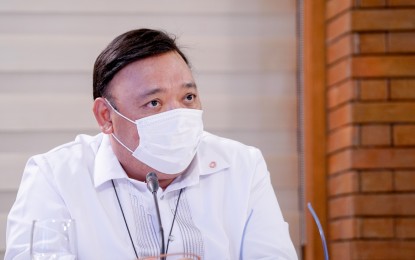
Presidential Spokesperson Harry Roque (File photo)
MANILA – Presidential Spokesperson Harry Roque on Sunday lashed out at the daily broadsheet Philippine Daily Inquirer (PDI) for publishing two reports about groups opposing his nomination for a seat at the UN International Law Commission (ILC), a body of experts tasked with developing and codifying international law.
Roque said “malice is present” in PDI’s two stories titled “Protests mar Roque’s New York City reception” and “Asia-Pacific lawyers’ group opposes nomination of Roque to UN commission”, which were both published on Sunday.
“The Philippine Daily Inquirer’s malice is very clear in its two recent stories against me regarding my candidature for the ILC. It is effectively a persecution,” he said in a press statement.
He pointed out that the first PDI report quoted protesters who referred to him as a “war criminal” and a “human rights violator” and editorialized that he “did not answer the accusations against” him.
“Your reporter never even interviewed me. That is indubitable. By publishing (what is clearly an opinion) that I did not answer the accusations, PDI effectively represented that the questions it published were legitimate,” he added.
Roque said he was usually “very tolerant” when it comes to the mass media but noted that the lawyer in him knew that “malice is present” when he was referred to as a “war criminal.”
“Sullivan is the standard. PDI imputes that I am a war criminal. Even President Duterte is not being accused of war crimes. By the way, whose human rights did I violate?” he said.
He was referring to the landmark New York Times Co. v. Sullivan case in 1964 which states that “‘actual malice’ -- that is, with knowledge that it was false or with reckless disregard of whether it was false or not.”
Roque questioned how PDI noted that there were “several Filipino American protesters” present.
“What does several mean, and according to whose standard? I recall reading the first version of the story which was different but also not representative of facts,” he said.
He also wondered how PDI’s first version of the story claimed “Bayan-USA and human rights organizations” rallied.
“I don’t know how you came up with the fact that there were ‘human rights organizations’ there. No human rights organization would deliberately push and box elderly waiters on the face, destroy property, and order food and beverage without paying for them. Please confirm your story with at least, the NYPD (New York City Police Department),” he added.
What is COLAP?
As for the second PDI report, Roque said the reporter failed to qualify what this Confederation of Lawyers of Asia and the Pacific (COLAP) is and who are its members.
He said the only available information about COLAP was found in a Facebook page with no description and with no indication of who its members are. The page merely describes it as a “lawyer and law firm.”
“It also claims to have a website but when we checked, the site is not up. There is only a photo. There is no information on the group. Yet, PDI legitimized the group and its claim,” he said.
Meanwhile, he said the PDI reports seemed to cite how the University of the Philippines, his alma mater, opposed his bid to the ILC but deliberately refused to qualify its stories.
“The UP Diliman Executive Council, led by Chancellor Fidel Nemenzo, is the one that issued a statement against me. The Diliman executive council is not the UP system,” he said.
He also slammed how PDI published stories about the the Free Legal Assistance Group (FLAG) and National Union of Peoples' Lawyers (NUPL) oppose his nomination -- but failed to qualify that both are headed by members of the opposition who are running for office.
“The above are clear instances of persecution by, and malice of, the Inquirer against me. The news reports from other newspapers were objective,” he added.
Roque is currently in the United States for the annual United Nations (UN) International Law Week.
He is among the 11 candidates from the Asia-Pacific region. Only eight seats are allotted for the Asia-Pacific States bracket in the UN body.
The election of the ILC members for a five-year term beginning Jan. 1, 2023, will take place at the 76th session of the General Assembly next month. (PNA)
